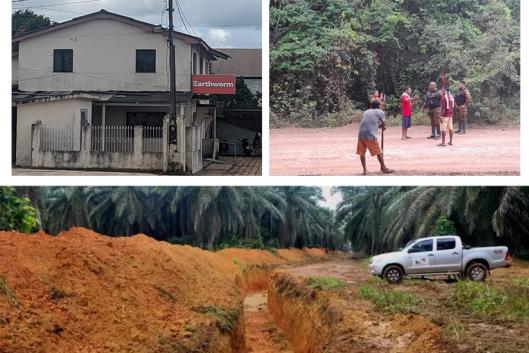WRM Bulletin 274 included an article on the work of the Earthworm Foundation, entitled: ‘NGOs at the service of plundering territories: the Earthworm Foundation case’ (1). It describes how corporations which are causing conflict in the territories where they operate profit from cooperation with groups like Earthworm Foundation, while violence against community activists, landgrabs and sexual assaults of women continue.
An interview in this article provides community perspectives into the Foundation’s engagement with the palm oil corporations Socfin and Agropalma in Cameroon and Brazil, respectively. The accounts highlight that despite communities denouncing ongoing violence, lack of vital living spaces for growing food, pollution and sexual assaults against women inside company plantations, Earthworm Foundation regularly attests that these companies are ‘making progress’ in the way they operate and in improving their relation with communities.
Shortly after the WRM Bulletin article was published, Earthworm Foundation issued a public statement on the article. (2) In an e-mail to the WRM Secretariat dated 8 May 2025, its Director of Communications expressed interest in "constructive dialogue” with WRM, to “deepen mutual understanding, and explore potential common ground in our shared goal: creating positive change for people and the planet”.
Action speaks louder than offers for dialogue
WRM stands with communities who are fighting to recover their lands. These struggles are about breaking the power that corporations wield and which allows them to increase their profits at the cost of others, while acting with impunity and getting away with violence in countless instances. One of WRM’s contributions to community struggles involves exposing the structural as well as specific incidents of corporate violence and giving visibility to community struggles for land. Consequently, WRM will not become another intermediary in a ‘dialogue’ process that has not resolved core conflicts which communities have been denouncing for years.
We published the Bulletin article to expose how years of Earthworm Foundation working with Agropalma and Socfin may have resulted in the companies having published nicely worded policies and procedures - but as far as communities are concerned, core conflicts have not been resolved.
Take the horror of sexual assaults which women living around Socfin plantations have been denouncing for years. Published in April 2025, the article “Sex-for-Work Allegations Hang Over Tycoons’ Rubber Plantations” (3) shows that sexual assaults are not limited to Socfin’s plantations in Cameroon. In its own reports on Socfin, Earthworm Foundation acknowledges that sexual assaults and rape took place in the company’s plantations. (4) Yet, what are the public responses to the ‘sex-for-work allegations’ article? In a Letter to the Editor, Socfin laments that the article “characterizes sexual violence as a rampant and generalized issue within our operations, which could not be further from reality.” Earthworm Foundation, meanwhile, chose silence both on the violence described in the article and Socfin’s response to it.
In its public reply to the WRM Bulletin article, Earthworm Foundation writes: “When companies fail to demonstrate genuine commitment or make insufficient progress, we do not hesitate to disengage.” On several occasions, communities in Brazil and Cameroon have made clear that as far as they are concerned, neither Agropalma nor Socfin have been showing genuine commitment and that they do not see ‘perceptible progress’ in ending the conflicts and corporate violence. How much longer does the horror of sexual assaults and rape in Socfin plantations, for example, have to continue before Earthworm Foundation concludes that there is insufficient progress for it to continue its engagement with the company?
The issue, however, goes much deeper than disagreement over Earthworm Foundation engagement with any specific corporate client. As Earthworm states in its public response to WRM’s article, its starting point is the belief that corporations “can transform the negative impacts of their supply chains and operations into positive outcomes for people and nature” as long as they procure “strong leadership and the right support.” For WRM, this starting point invariably implies tacit acceptance of colonial-era land grabs on a massive scale and impunity for countless acts of corporate violence and destruction past and present. It implies accepting what corporate executives are willing to concede, not what communities are entitled to. In short, Earthworm Foundation and WRM have chosen different loyalties. Violence, landgrabs, pollution and sexual assaults against women are part of the corporate model of profiting from exploitation of communities and their lands. Ending this violence means ending corporate control over community lands.
We stand with forest peoples demanding justice and an end to corporate control over their lands.
WRM Secretariat
References:
(1) WRM Bulletin 274. NGOs at the service of plundering territories: the Earthworm Foundation case.
(2) Earthworm Foundation’s Response to the World Rainforest Movement Article.
